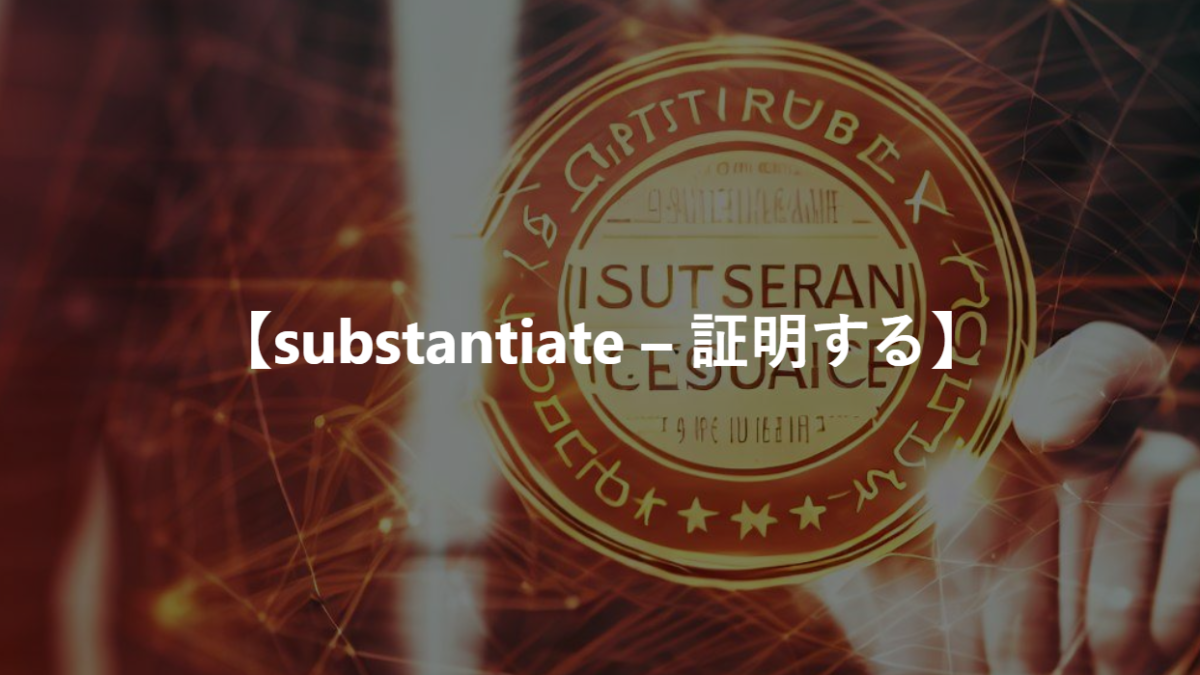語源・類義語・反対語・例文
【substantiate – 証明する】という単語の語源とか由来を知っていますか?
「substantiate」はラテン語の「substantia」から派生しています。これは「実質」や「本質」という意味で、「sub」(下)と「stantia」(立つ)の組み合わせから成り立っています。つまり、何かが「下に立つ」、すなわちしっかりとした基盤や実質を持つことを示しています。この語源から、「substantiate」は何かを実質的に支持する、または裏付ける行為、つまり証拠や根拠によってその真実性や有効性を証明することを意味するようになりました。時間が経つにつれて、この単語は主に何かの主張や理論を具体的な証拠や事実によって支持し、確認することを指すようになり、広く使用されるようになりました。
The word “substantiate” is derived from the Latin “substantia,” which means “substance” or “essence,” composed of “sub” (under) and “stantia” (standing). This implies something that “stands under,” in other words, having a solid foundation or essence. From this origin, “substantiate” came to mean the act of supporting something substantially, or proving its truthfulness or validity through evidence or grounds. Over time, this word has primarily come to refer to the act of supporting a claim or theory with concrete evidence or facts, becoming widely used in this context.
この単語の類義語・反対語を教えてください。
類義語
- Verify: 検証する。情報や事実が正しいかどうかを確認する行為。
- Corroborate: 裏付ける。他の証拠や情報によって主張などを強化する。
- Confirm: 確認する。ある情報や疑念に対して正しさを証明する。
- Validate: 正当化する。あるものが正当または有効であることを証明する。
- Prove: 証明する。論理的または実証的な方法により真実性を示す。
反対語
- Refute: 反駁する。ある主張や理論が誤っていることを証明する。
- Disprove: 誤りを証明する。ある主張や仮説が間違っていることを示す。
- Deny: 否定する。ある事実や主張の正しさを認めないこと。
- Discredit: 信用を落とす。ある情報や人物の信頼性を低下させる。
- Reject: 拒絶する。ある提案や理論を受け入れないこと。
この単語を使った例文を5つほど教えてください。
The scientist was able to substantiate his theory with extensive research and empirical evidence.
(その科学者は幅広い研究と経験的証拠によって自身の理論を裏付けることができました。)
The detective gathered evidence to substantiate the suspect’s alibi.
(刑事は容疑者のアリバイを証明するために証拠を収集しました。)
The financial report substantiates the company’s claims of profitability.
(財務報告書は企業の収益性の主張を裏付けています。)
The witness’s testimony helped to substantiate the plaintiff’s case.
(証人の証言は原告の訴えを裏付けるのに役立ちました。)
The research study aims to substantiate the effectiveness of the new drug in treating the disease.
(その研究は新薬の病気の治療効果を証明することを目指しています。)
【substantiate – 証明する】のコロケーション
- Substantiate a claim: 主張を証明する。ある主張やアイデアが真実であることを、証拠やデータによって実証するプロセスを指します。この表現は、法律や学術研究の分野で頻繁に使用されます。
- Substantiate evidence: 証拠を裏付ける。特定の証拠が有効であること、または事件や主張と関連があることを示す行為。これにより、証拠の信頼性が強化されます。
- Substantiate an argument: 議論を裏付ける。ある論点や議論が正しいことを、論理的な推論や実証的な証拠によって証明すること。有効な議論を構築するために重要です。
- Substantiate findings: 調査結果を証明する。研究や調査によって得られた結果が正確であることを、追加のデータや分析によって確認するプロセス。科学的研究において特に重要です。
- Substantiate a theory: 理論を裏付ける。ある理論が有効または正しいことを、実験結果や観察によって証明する行為。理論の信頼性を高め、広範な受け入れを促進します。
「substantiate」は、ある主張や事実が真実であることを証明する際に使用される重要な単語です。ここでは、「substantiate」の使用に関連する一般的なコロケーションと、それらがどのようにして情報の正確性や信頼性を高めるのに役立つかについて説明します。
Substantiate a claimは、主張やアイデアの真実性を証明するプロセスを指します。法律や学術研究の分野で特に重要であり、正確な証拠やデータに基づいて主張を支持することを意味します。
Substantiate evidenceは、特定の証拠が事件や主張と関連があること、または有効であることを示す行為です。証拠の信頼性を強化し、その重要性を明らかにします。
Substantiate an argumentは、論点や議論が正しいことを論理的推論や実証的証拠によって証明することを指します。有効な議論を構築する上で不可欠です。
Substantiate findingsは、研究や調査によって得られた結果の正確性を追加のデータや分析を通じて確認するプロセスを意味します。これは科学的研究において特に重要で、調査結果の信頼性を高めます。
Substantiate a theoryは、理論が有効または正しいことを実験結果や観察によって証明する行為です。理論の信頼性を高め、その理論の広範な受け入れを促進します。
これらのコロケーションを通じて、「substantiate」がどのように情報や主張の正確性を証明し、その分野における信頼性と説得力を高めるのに役立つかが明らかになります。証明された情報は、より強い信頼と価値を持ち、議論や理論の受け入れを促進する重要な要素となります。
The word “substantiate” is crucial when proving the truth of a claim or fact. Here, we explain common collocations associated with “substantiate” and how they help enhance the accuracy and credibility of information.
Substantiate a claim refers to the process of proving the truthfulness of a claim or idea. It is particularly important in legal and academic research fields, meaning to support a claim based on accurate evidence or data.
Substantiate evidence involves demonstrating that specific evidence is related to an event or claim or is valid. It strengthens the reliability of the evidence and clarifies its significance.
Substantiate an argument points to proving that a topic or discussion is correct through logical reasoning or empirical evidence. It is essential for constructing a valid argument.
Substantiate findings means verifying the accuracy of results obtained through research or investigation by additional data or analysis. This is especially critical in scientific research, enhancing the reliability of the findings.
Substantiate a theory denotes the act of proving that a theory is valid or correct through experimental results or observations. It increases the theory’s credibility and promotes its widespread acceptance.
Through these collocations, it becomes clear how “substantiate” aids in proving the accuracy of information and claims, thereby increasing their reliability and persuasive power in the field. Substantiated information carries greater trust and value, becoming a crucial element in promoting the acceptance of arguments or theories.
文法問題
問題1
Choose the correct word to complete the sentence.
“The researcher had to __ his findings with concrete evidence.”
- A) deny
- B) obscure
- C) substantiate
- D) disprove
正解: C) substantiate
解説: 文脈から判断して、「証明する」という意味の動詞が必要です。選択肢Cの「substantiate」が最適です。
問題2
Select the word that best fits the sentence.
“In order to win the case, the lawyer must __ the claims with credible witnesses.”
- A) fabricate
- B) substantiate
- C) ignore
- D) refute
正解: B) substantiate
解説: 文の文脈から、ここでは「証明する」という意味の動詞が最適です。選択肢Bの「substantiate」が適切です。
問題3
Fill in the blank with the appropriate word.
“The scientist’s theory was groundbreaking, but he needed to __ it with experimental data.”
- A) hypothesize
- B) substantiate
- C) invalidate
- D) disregard
正解: B) substantiate
解説: 文脈から、ここでは「証明する」という意味の動詞が必要です。選択肢Bの「substantiate」が最も適しています。
問題4
Complete the sentence with the correct word.
“The company must __ its marketing claims to avoid misleading consumers.”
- A) diminish
- B) substantiate
- C) obscure
- D) falsify
正解: B) substantiate
解説: 文脈から、ここでは「証明する」という意味の動詞が最適です。選択肢Bの「substantiate」が適切です。
問題5
Choose the best word to fill in the blank.
“The journalist worked hard to __ the allegations before publishing the story.”
- A) ignore
- B) substantiate
- C) conceal
- D) deny
正解: B) substantiate
解説: 文の文脈から、ここでは「証明する」という意味の動詞が必要です。選択肢Bの「substantiate」が最適です。

